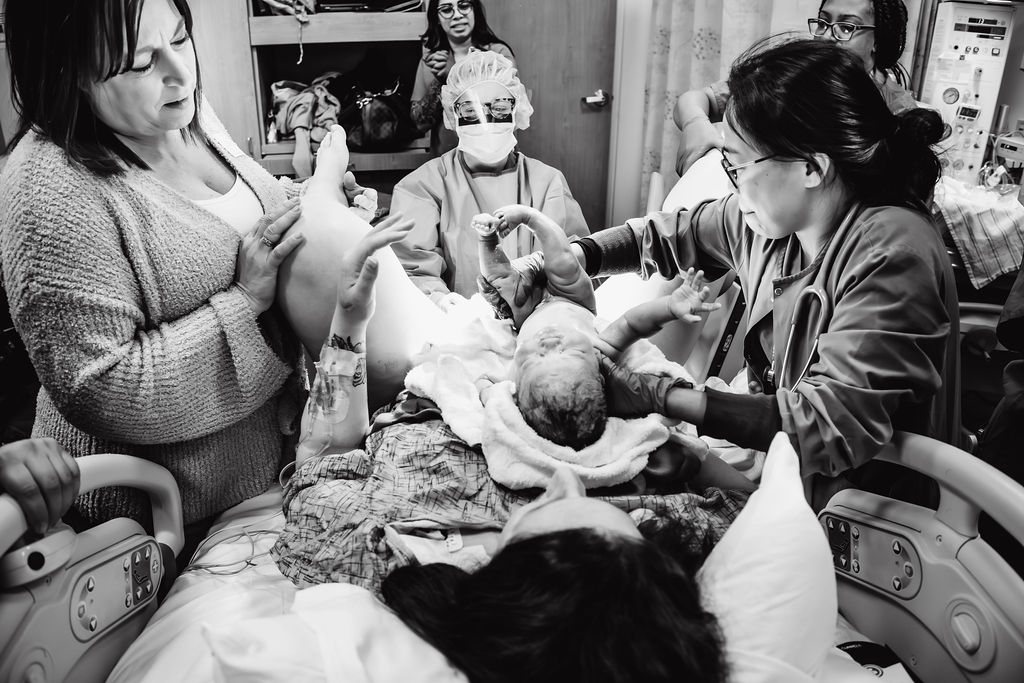
When I first heard the word “Doula”, I admit, I had some assumptions that were completely NOT true.
Doulas do NOT offer any medical support. They do NOT deliver babies. So, what DO they do???
When it comes to childbirth, there’s an array of professionals dedicated to ensuring that both mother and baby are safe and healthy. While obstetricians and midwives often take the spotlight, another essential support figure is the doula. Though not medical professionals, doulas provide indispensable emotional, physical, and informational support during pregnancy, labor, and postpartum. Here are five key roles that doulas play in the birthing journey.
1. Emotional Support
One of the most crucial roles a doula plays is providing emotional support to the birthing person and their family. Pregnancy and childbirth can be an emotional rollercoaster, filled with excitement, anxiety, and sometimes fear. Doulas offer a calming presence, helping to alleviate stress and build confidence. They listen to concerns, provide comfort, and ensure that the birthing person feels heard and supported throughout the process. And this starts months before baby arrives!

2. Physical Comfort
Labor can be physically demanding, and this is where a doula’s expertise in offering physical comfort measures comes into play. Techniques such as massage, breathing exercises, and positioning can make a significant difference in managing pain and facilitating a smoother labor. Doulas are skilled in various methods to help ease discomfort, whether it’s through counter-pressure, warm compresses, or even just holding a hand during contractions.

3. Informational Support
The journey to childbirth is filled with decisions—from choosing a birth plan to understanding various medical interventions. Doulas provide evidence-based information that helps the birthing person and their family make informed choices. They can explain medical jargon, offer insights into different birthing options, and clarify the pros and cons of various interventions. This empowers parents-to-be to make decisions that align with their values and preferences.
Doulas are especially good at offering suggestions for exercises, stretches, etc, to help get baby positioned correctly in preparation for birth. If baby is positioned correctly, and your body is ready, this can potentially help prevent C-Sections and/or a traumatic birth experience.

4. Advocacy
In a hospital setting, it’s easy to feel overwhelmed by the medical environment and procedures. Doulas serve as advocates for the birthing person’s wishes and birth plan. They help communicate these preferences to the medical staff, ensuring that the birthing person’s voice is heard. While they don’t speak on behalf of the patient, they encourage and support them in expressing their needs and concerns, fostering a collaborative atmosphere between the family and healthcare providers.

5. Postpartum Support
The role of a doula doesn’t end once the baby is born. Postpartum doulas provide critical support in the weeks following childbirth, a period often filled with both joy and challenges. They assist with breastfeeding, offer newborn care tips, and provide emotional support as the family adjusts to their new life. This ongoing support can make a significant difference in the recovery process and in fostering a positive postpartum experience.
In conclusion, doulas play a multifaceted role in the childbirth journey, offering emotional, physical, and informational support, advocating for the birthing person’s wishes, and providing essential postpartum care. Their presence can transform the birthing experience, making it more empowering, informed, and comfortable. If you’re expecting a baby or planning to start a family, considering a doula could be one of the best decisions you make for your childbirth journey.
If you are looking for a birth doula, I am now taking clients :). Hope to hear from you soon!
Modesto Birth Photographer, Modesto Birth Doula, Walnut Creek Birth Photographer & Doula